Reading List: 5 new Australian plays about families and loss
Looking for something new to read? Want to hear some exciting Australian voices tell exciting Australian stories? Over the past few years, Australia has produced five vastly different and incredibly poignant plays that look at Australian families, at loss, at grieving and growing. Looking for some excellent, cathartic reads? Add them to your reading pile now!
1. Babyteeth, by Rita Kalnejais ($19.95 at Currency Press)
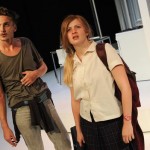
Starting with the death of teenage daughter Milla and moving backwards through time, Babyteeth is a lyriac, elegiac wonder: a family drama of tender rawness. Milla brings rough-as-guts Moses home as a boyfriend, but what can her parents say when she’s dying before her 15th birthday and they’re barely hanging onto rationality themselves? With plenty of natural laughs (it’s a romantic comedy about death, no, seriously), and a Latvian violin instructor to boot, there’s something wrenchingly beautiful about the script itself; the stage directions evoke an open, mystical quality as the sprawling plot unfolds. Let it play across your thoughts, and don’t worry if you cry – we all did in the theatre, too.
2. Angela’s Kitchen, by Paul Capsis and Julian Meyrick ($19.95 at Currency Press)
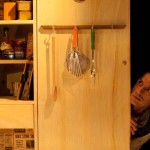
Paul Capsis is, of course, a national treasure. An actor, singer, and cabaret performer, he is well known for charisma and knack for storytelling, especially with his beautiful-with-an-edge tone and honest, open expression. But this is a family story close to Capsis’ heart and the only character he assumes are momentary, loving impressions of family members. This one-man play is about his grandmother Angela’s migration from Malta to Australia, and Capsis’ pilgrimage to Malta to discover her story. Intertwined, he weaves a family legacy from their journeys, their similarities and differences, and by stripping himself bare and sharing the backbone of his life, Capsis and Meyrick have coaxed out a shining, enduring taste of love and loss you won’t soon forget.
3. The Secret River, by Kate Grenville ($22.95, Currency Press)
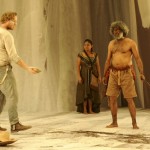
Image – Heidrun Lohr
Adapted by Grenville’s book of the same name and a labor of love for Andrew Upton and Cate Blanchett, the artistic directors of Sydney Theatre Company who developed the play and brought it to the stage, this is an Australian historical epic. William Thornhill, a convict that his earned his freedom, is determined to give his young family a new home in their new country, up near the Hawkesbury River in NSW. The only problem is, someone already lives there: the Dharug people. This play fiercely refuses to shy away from the politics, morality, ethics, and psychology of the sense of home, and place, and ownership: as Thornhill pushes for the land to call his own in the most horrible ways, a history of Australia that we too often pretend never happened relentlessly emerges on the stage, and in the pages of the script. It was a massive hit and it still resonates in the script: this is an important, must-read work.
4. Forget Me Not, by Tom Holloway ($19.95 at Currency Press)
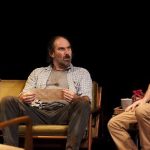
At the heart of Forget Me Not, speaking of hidden Australian history, is the story of Child Migrants: post-war kids who were taken from the home of British mothers (usually poor, or single, unmarried women) who were deemed unfit mothers in a fit of conservative piety. Instead of being raised by a loving and benevolent family in Australia, children were often raised in harsh and unbearable environments, and they never knew their real families. Gerry, our protagonist, a survivor of the scheme, is understandably a mess: an angry drunk who couldn’t keep his marriage together or keep the respect of his daughter, either. When a case worker uncovers what he’s sure is Gerry’s mother, something starts to shift and shatter inside him – that maybe, possibly, somewhere inside him he’ll know who he is and his place in the world; can he remember how to love something if it’s his mother? Beautifully written, Holloway brings the internal world of a very internal man to vivid life. One of the best plays of the decade thus far.
5. The Brothers Wreck, by Jada Alberts ($19.95 at Currency Press)
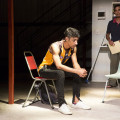
Jada Alberts is an exciting, rising talent in Australian playwriting, a recipient of the Balnaves Foundation Indigenous Playwright’s Award. The Brothers Wreck feels new and old and urgent and normal all at once – that particular confluence of feelings that means a play finds something authentic about the human experience and reflects it back to the audience. One morning, Ruben wakes up to find his cousin hanging from the rafters, and, slowly, a play about death becomes a play about life: a family tries to hold itself together and to keep Ruben from ending up on a rafter too, because he becomes adrift when Joe dies. He drinks too much, he withdraws, he drives his sister and his counselor mad, and it’s monsoon season, and everything is sweltering and bearing down like sticky heat, and just as much as Ruben can’t escape grief, nor can we escape this story, and the massive dose of compassion it has for its characters, and for any person who may see themselves in them. It’s about family needing each other, bonding and taking care and not caving, and it’s deeply, deeply moving.


